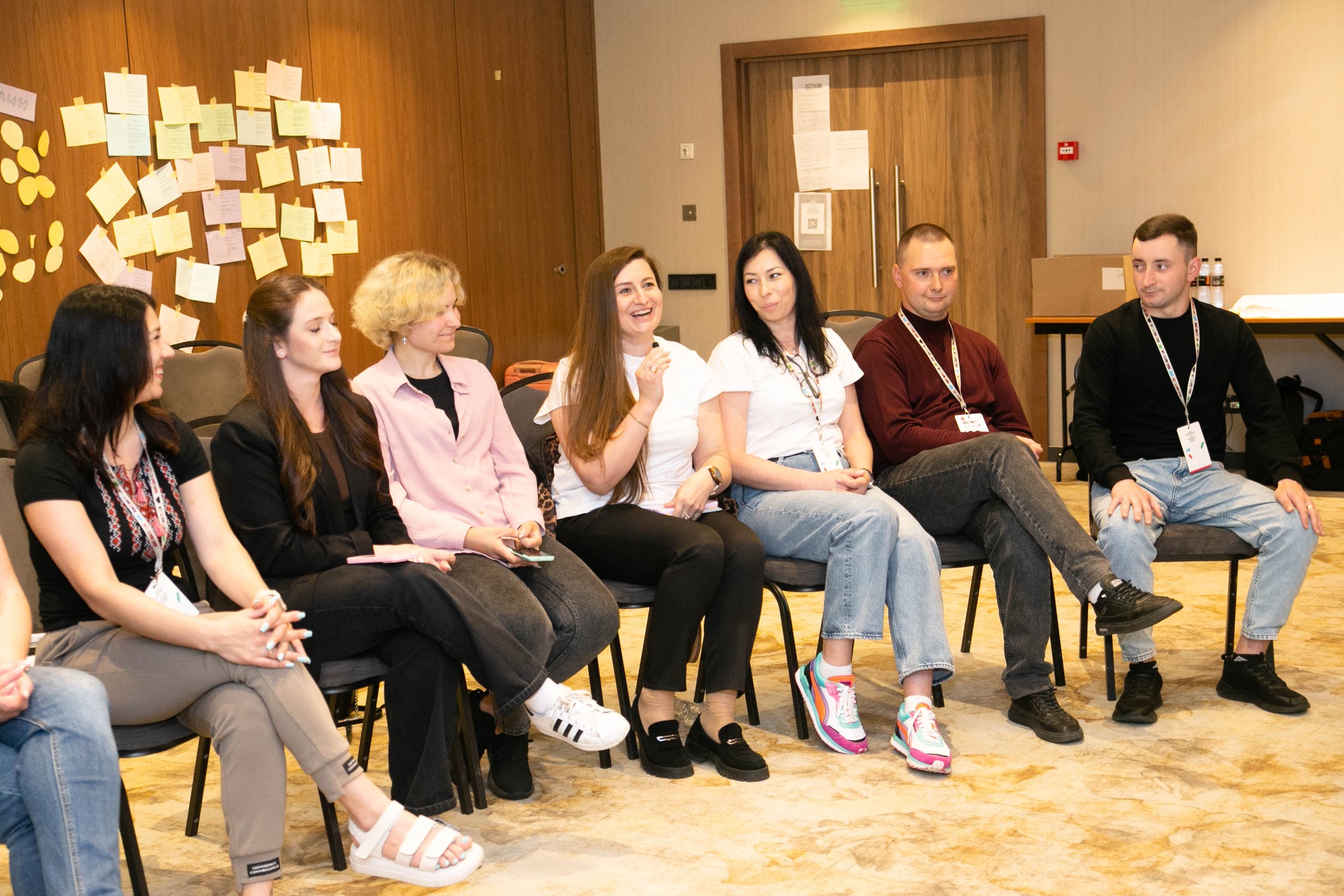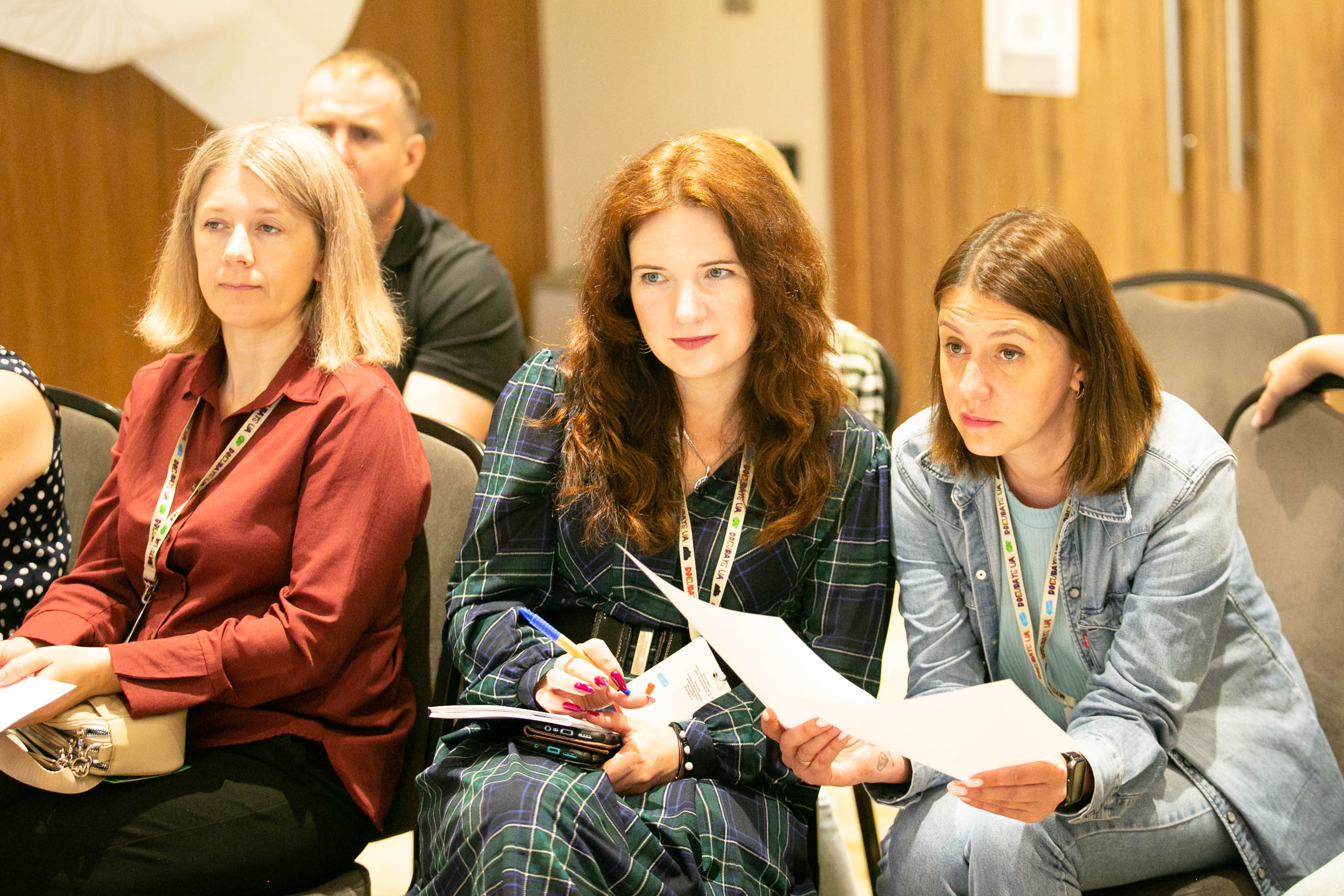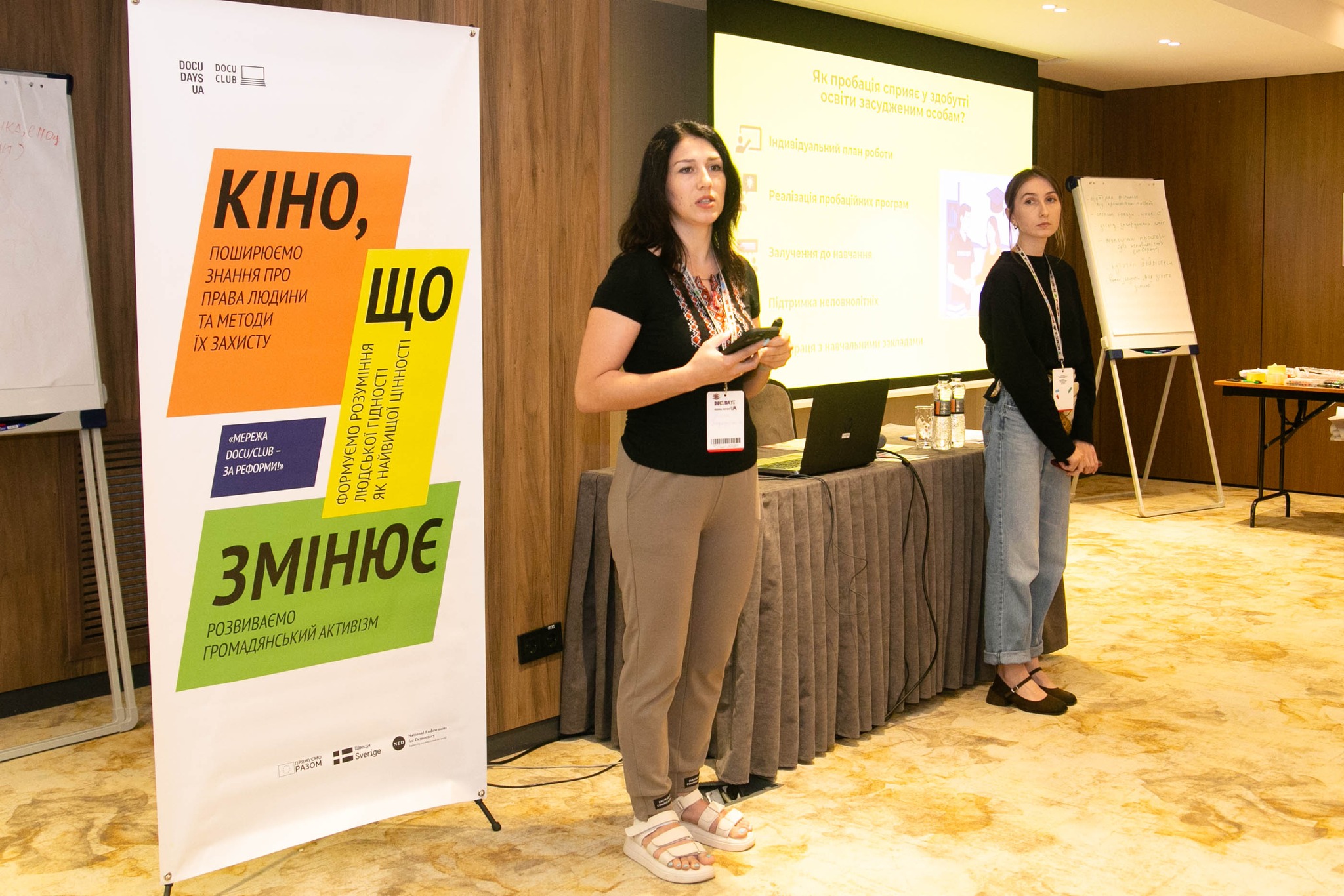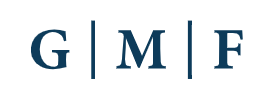
The event brought together 48 film clubs’ moderators from various regions of Ukraine. The conference became a space for support, learning, and inspiration for people who use documentary films as a tool for dialogue, education, and social change in their communities.
The event opened with an award ceremony in honor of the winners of the Impact and Success Story Competition for film clubs. Moderators shared touching and powerful stories that demonstrated how film club activities are not only about watching films, but also about engaging in profound discussions that can shift perspectives, influence behavior, and, at times, change lives.
The three-day conference featured a rich and diverse program. Participants attended training sessions addressing topics relevant to the work of moderators of film clubs at probation centers and correctional institutions.

Conference participants
Alina Pavliuk, lawyer and coordinator of the Legal Advisory Group’s team of lawyers, delivered a lecture titled “International Humanitarian Law: What Moderators Should Know.” The lecture focused on the ways to speak with audiences about war, responsibility, and protection of civilians, as well as on the prospects for achieving justice and holding the aggressor accountable.
Olena Kochura, the Lead National Expert on Penitentiary Reform Support for the EU Project “Pravo-Justice,” focused on the challenges of reintegrating formerly incarcerated individuals into law-abiding life within communities. Olena’s session, dedicated to “European Approaches to the Resocialization of People in Conflict with the Law,” was filled with practical tools and recommendations based on the most effective practices of her European colleagues. During the session, moderators actively engaged in a discussion on the role of film clubs in supporting individuals who return to community life after serving their sentences.
Another session focused on the development of practical skills was “A Trauma-Sensitive Approach in Film Club Activities,” led by Maryana Hevko, psychologist, psychotherapist, and member of the National Psychological Association and the Ukrainian Union of Psychotherapists. The session was interrupted by an air raid alert, which unexpectedly allowed participants to apply in real-time the advice and techniques they had just learned — methods designed to better understand the needs of vulnerable viewers. The discussion of the challenges faced by film clubs during wartime continued in the shelter.
Photo: Conference participants
Olha Babchuk and Tetiana Husar from the DOCU/CLUB Network’s communications team conducted da training session titled “The Power of Words: Effective Communication for Enhancing the Visibility of Film Clubs,” which was designed to equip participants with practical skills in promoting and communicating their film club’s work. Participants learned how to prepare social media content, take compelling photographs, and interact with the media in ways that would engage broader audiences.
The presentation of the War Archive project, delivered by the project’s Partnership Manager, Maryna Kostiuk, was particularly important for moderators working in film clubs at probation centers and correctional facilities. Moderators heard about the ongoing efforts to document testimonies of crimes committed during Russia’s full-scale invasion of Ukraine and learned to use the War Archive platform. This information is especially relevant to their work with individuals convicted of collaboration and related crimes.

Conference participants
It is encouraging that many moderators within the DOCU/CLUB Network community have already developed unique approaches and discovered effective tools for addressing specific needs of their film clubs’ audiences. Lina Babych, coordinator of the DOCU/CLUB Network’s film clubs at probation centers and correctional facilities, compiled a collection of successful practices to facilitate peer-to-peer exchange. The moderators’ enthusiasm and active contribution to the discussion of these practices was truly inspiring and affirmed the strong potential for further growth of the film club movement. Working in small groups, moderators shared their ideas and examples of successful initiatives. Through collaborative brainstorming sessions, they explored ways to overcome common challenges. This was an informal yet meaningful dialogue between people who deeply understand the potentially powerful impact of documentary films.

Alina Bereznytska and Vira Karpinska
The conference would not have been possible without a workshop on moderated documentary film screenings. Vira Karpinska, moderator of the Docudays UA film club at the Lviv Municipal Library, and Alina Bereznytska, moderator of the Docudays UA film club at the Kherson branch of the State Institution “Probation Center,” hosted a screening and discussion of the film Out Loud by director Niccolò Salvato. During the session, they shared their experience of how libraries and probation centers can join efforts to support and resocialize juvenile offenders.
The annual moderators’ conference is not only a space for active learning, but also a place for building new connections and generating fresh ideas. It’s filled with warmth, mutual support, laughter, and joy, along with the inspiration and energy for all the participants to take home and apply in their work.

Nina Khoma
During the closing of the conference, Nina Khoma, Head of the DOCU/CLUB Network, remarked: “Every meeting with our moderators is an incredible source of faith and inspiration. We realize how much warmth, strength, and dedication you put into your daily work. Every film club is a space where dialogue begins, and people have the chance to be heard. This conference is a reminder that we create an environment of trust, where people find support, transform themselves, and change the world around them with the power of cinema. I am grateful you are with us, and I thank you for your open hearts. You inspire us to keep moving forward.”
Such events reaffirm that the DOCU/CLUB Network is not just a platform for film screenings, but a strong, committed community of people who are making the world around them a better place with every film and discussion.
The development of the DOCU/CLUB Network is funded by the Embassy of Sweden in Ukraine, the National Endowment for Democracy (NED) and Fondation de France.
The opinions, conclusions or recommendations are those of the authors and compilers of this publication and do not necessarily reflect the views of the governments or charitable organizations of these countries. The authors and compilers are solely responsible for the content of this publication.



